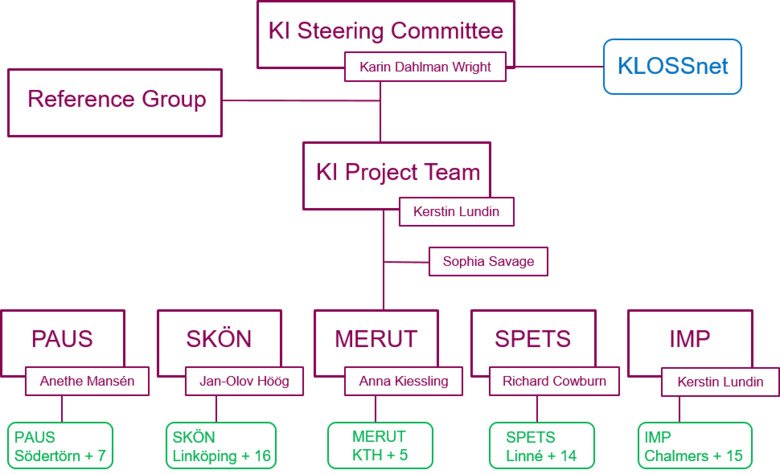SKISS - a project to strengthen the strategic collaboration capacity at KI
In dedicated initiative the innovation agency Vinnova has granted funding to Swedish higher education institutions (HEIs) to develop their collaborative capacity and support strategically important needs in this area. KI is an active partner in this initiative and are working together with other HEIs to develop an increased capacity for collaboration.
The projects in which KI has chosen to participate complement one another and are intended to produce synergistic effects for our university. To achieve this, KI is coordinating participation in these Vinnova-funded, cross-institutional projects through an umbrella project known as SKISS.
The purpose of SKISS is to provide everyone at KI with the opportunity to both develop an understanding of and to take responsibility for developing collaboration as an integrated part of our core activities, thereby strengthening the quality of education and research. Among other things, this will be achieved by making methods and tools available to clarify and facilitate collaboration and utilisation.
Collaboration is defined as an interactive process that creates mutual benefits, both for the university and the surrounding society. Collaboration must be viewed as an integrated component of the university’s core activities rather than as an isolated activity.
KI is participating in five cross-institutional collaborative projects
PAUS
Personal mobility promotes collaboration between the university and society at large. Through strategically targeted personal mobility, new knowledge can be acquired for KI’s education and research, offering new perspectives to teachers and researchers.
8 participating HEIs, coordinated by Södertörn University.
SKÖN
SKÖN - A Collaboration integrated quality-assurance system to increase utilisation.
The purpose of the project is to support the work of HEIs in developing operational models for quality assuring collaborative tasks as an integrated part of the university’s overall mission (research, education and collaboration).
17 participating HEIs, coordinated by Linköping University.
MERUT
MERUT- Methods for capturing the societal relevance of higher education.
This project will guide the way in clarifying how societal relevance can be captured in university quality-assurance systems to contribute in developing and designing higher education at KI. Experiences will be utilised and effective metrics formulated.
6 participating HEIs, coordinated by KTH Royal Institute of Technology.
SPETS
SPETS - Strategic partnership for efficient and transparent collaboration.
This project will develop structured working methods and tools for strategic partnerships, including the necessary prerequisites and criteria for establishing and managing such partnerships. Ethical issues will also be addressed as well as the processes for anchoring and communicating strategic partnerships.
15 participating HEIs, coordinated by Linnaeus University.
IMP
IMP - Implementation of working methods and increased knowledge in the field of knowledge assets and intellectual property.
This project supports the implementation of Knowledge Management Platform methods to increase the utilisation and realisation of innovations. This includes increasing awareness of the concepts and strategic importance of knowledge assets and intellectual property.
16 participating HEIs, coordinated by Chalmers University of Technology.

Press release published 2018, KI starts collaborative efforts with other higher education institutions
